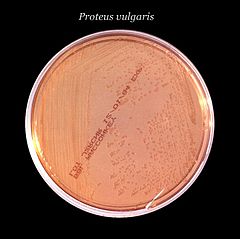Proteus (bacterium)
| Proteus | |
|---|---|
 |
|
| Proteus vulgaris growth in MacConkey agar culture plate | |
| Scientific classification | |
| Domain: | Bacteria |
| Phylum: | Proteobacteria |
| Class: | Gammaproteobacteria |
| Order: | Enterobacteriales |
| Family: | Enterobacteriaceae |
| Genus: |
Proteus Hauser 1885 |
| Species | |
P. hauseri
P. mirabilis
P. myxofaciens
P. penneri
P. vulgaris
Proteus is a genus of Gram-negative Proteobacteria. Proteus bacilli are widely distributed in nature as saprophytes, being found in decomposing animal matter, sewage, manure soil, the mamallian intestine, and human and animal feces. They are opportunistic pathogens, commonly responsible for urinary and septic infections, often nosocomial.
Three species—P. vulgaris, P. mirabilis, and P. penneri—are opportunistic human pathogens. Proteus includes pathogens responsible for many human urinary tract infections.P. mirabilis causes wound and urinary tract infections. Most strains of P. mirabilis are sensitive to ampicillin and cephalosporins. P. vulgaris is not sensitive to these antibiotics. However, this organism is isolated less often in the laboratory and usually only targets immunosuppressed individuals. P. vulgaris occurs naturally in the intestines of humans and a wide variety of animals, and in manure, soil, and polluted waters. P. mirabilis, once attached to the urinary tract, infects the kidney more commonly than E. coli. P. mirabilis is often found as a free-living organism in soil and water.
About 10–15% of kidney stones are struvite stones, caused by alkalinization of the urine by the action of the urease enzyme (which splits urea into ammonia and carbon dioxide) of Proteus (and other) bacterial species.
Proteus species do not usually ferment lactose, but have shown to be capable lactose fermenters depending on the species in a triple sugar iron (TSI) test. Since it belongs to the family Enterobacteriaceae, general characters are applied on this genus. It is oxidase-negative but catalase- and nitrate-positive. Specific tests include positive urease (which is the fundamental test to differentiate Proteus from Salmonella) and phenylalanine deaminase tests.
...
Wikipedia
